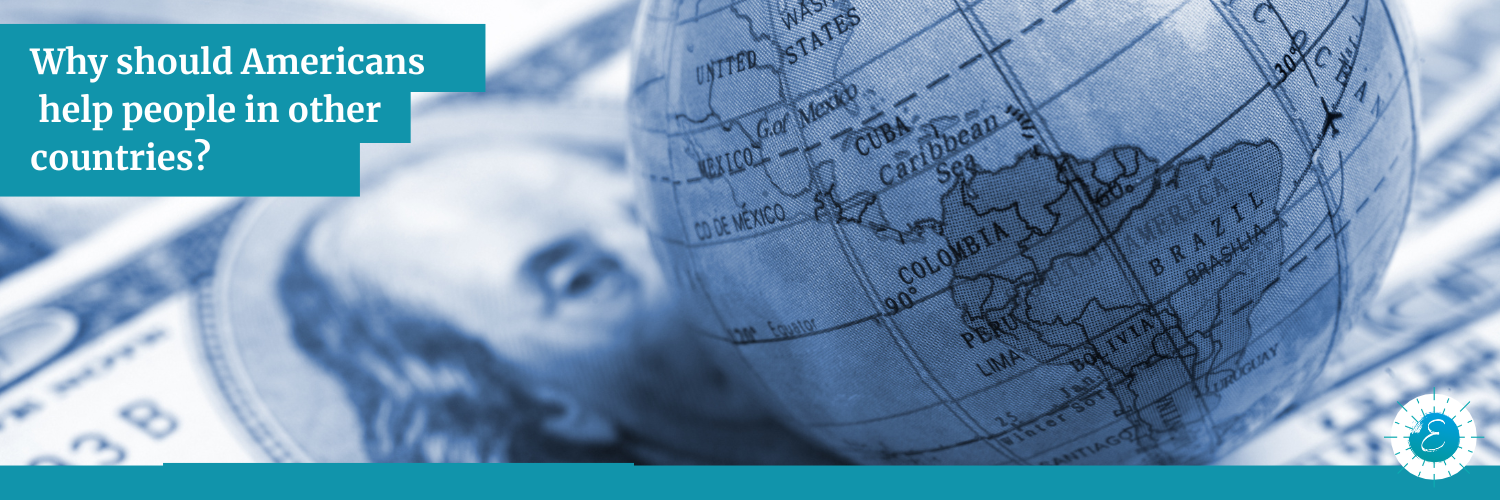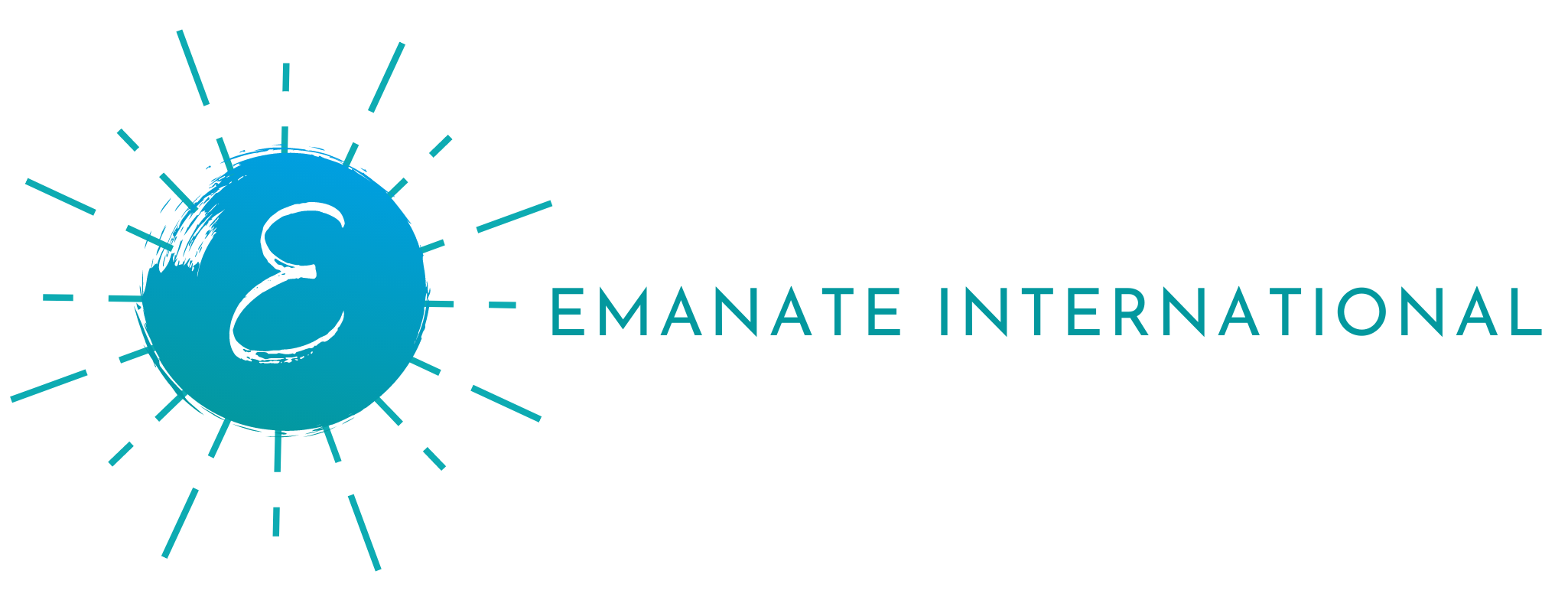
What are the benefits to to supporting development initiatives abroad?
Our world contains both tremendous beauty and potential for innovation and progress, and simultaneously is replete with horrific events. Not only can natural disasters obliterate homes and destroy crops leaving communities in peril, but numerous forms of corruption also can bring about immense suffering and death to innocent people. While these dichotomies are universal, it is also true that some nations are better equipped to respond to crises and corruption than others. The United States is a nation that has numerous resources not only economically but also in regards to its diplomatic and military power abroad. Some nations that suffer at the hands of corrupt leadership, or simply a lack of economic resources, often rely on support from nations like the US.
Whether support given abroad comes from private donors or government funds, often the question is posed: “Why should Americans care about problems in other countries when we have plenty of our own issues to solve at home?” Indeed, this is a valid point, and we agree that resources state-side should also be invested to improve the quality of life for people in need at home. However, there are good reasons that Americans should be interested in the well-being of people in other nations. Not only is American support for foreign development the right thing to do – it is in our direct interest to do it.
Before we delve into the reasons Americans should care about problems in other nations, let’s address a common frustration that numerous Americans express regarding how their valuable tax dollars are sometimes sent to other countries while problems continue at home. When news reports spout out how many billions of dollars are sent in response to a war or famine in a faraway place, it is understandable why a struggling American who pays their taxes might feel slighted by their own government. However, what the American people might not realize is how much of the federal budget is actually spent on foreign interests. While it’s true that the US typically contributes the highest total aid dollars globally, it’s not the highest donor nation per capita. Regarding the entirety of the foreign affairs budget, the total federal contribution has historically hovered around 1% annually. (More details on How the Foreign Affairs Budget is Spent here, and A Case for Foreign Aid here.)
Furthermore, we recognize that all dollars allocated are not always equal, and that the development sector has room for improvement in how resources are mobilized abroad to ensure that local communities have agency in their own progress towards self-sufficiency. At this time, we will not expound on that aspect, but will focus on the benefits of helping struggling nations to achieve national stability and prosperity. These points are not only in support of US foreign assistance but also apply to private donors who support locally-led development initiatives in the global south. We ascertain that there are three compelling reasons that Americans should care about the empowerment of struggling countries. The first is economic advancement, the second is an investment in national security, and the third is the moral responsibility to care for those in need.
Regarding economic advancement, the success of the global economy is deeply interconnected, and the success or failure of one nation’s economy has direct implications for other countries. One example of this is the supply chain. When a nation that typically supplies a commodity such as grain, sugar, or oil to another nation is unable to procure goods due to conflict or climate instability, the demand outweighs the supply and that commodity becomes more expensive which increases inflation. Furthermore, the decrease in supply slows down the distribution not only of the product in question, but other goods and services those products are needed to make. For example, wheat from Ukraine and sugar from Haiti may be needed to create a breakfast cereal from a US based company. If either one or both of those commodities become unavailable, the company runs the risk of losing expected revenue and may need to lay off American employees. Heavy unemployment state-side not only disrupts the US economy, but can destabilize markets all over the world and threaten to plunge everyone into another global recession.
Another example is when governments collapse in emerging markets in Africa. Lack of stable governance gives corrupt actors room to subvert ethical business activities, such as disrupting shipping lanes in the Red Sea or exploiting local resources such as gold or crude oil to sell illegally. Corruption facilitates black market transactions that perpetuate exploitation of people and local resources that only further exacerbate a vicious cycle of poverty and illicit activities. When people in developing nations are not equipped, or denied the opportunity, to advance economically this vicious cycle perpetuates more poverty. For example, a parent cannot afford to send their child to school*, so their opportunities remain limited and generational poverty continues. Often child marriage becomes the best solution for a family to sustain itself which further limits a girls’ likelihood of pursuing an education and breaking the cycle.
Furthermore, many households in underdeveloped nations lack access to reliable health care and safe, potable water. Lack of basic health care, preventative vaccines, and clean water subjects communities to more illnesses that require higher medical costs to the family and put even greater financial strain due to additional expenditures and loss of time working for income. For example, in 2013 the World Bank estimated that people in developing nations lost an estimated $260 billion USD annual costs incurred due to poor sanitation and lack of clean water.
Conversely, when people in any nation are equipped to earn livable wages and live healthy lives, a virtuous cycle of prosperity can grow. Having a reliable source of income allows parents the ability to ensure their children are fed, clothed, and educated. How does education impact the economy? According to the Mercer Equation, the rate of return for financial earning potential increases from 5-8% per each year of formal education. The World Bank also affirms that education “drives long-term economic growth, spurs innovation, strengthens institutions, and fosters social cohesion.”
Furthermore, aid dollars invested in global health and WASH initiatives have had tremendous impacts globally both economically and in terms of minimizing illnesses that can spread to other countries and wreak havoc globally. For example, The US President’s Plan for Aids Relief (PEPFAR) has reportedly saved an estimated 25 million people, and allowed 5.5 million babies the opportunity to be born free of AIDs/HIV. Regarding access to clean water and sanitation, the World Health Organization estimates that every dollar invested in WASH yields a positive ROI* of $4.3 USD and and estimated gain of $1.5 global GDP*.
How does economic advancement in a developing nation impact the US? One way is that a nation that is dependent on foreign assistance could prosper enough to become a trade or business partner rather than an aid recipient which could become a mutually beneficial liaison.
The U.S. economy relies upon stability and predictability in economic and political events around the world. Americans can support international development programs not only to stabilize these markets, but also to help pave the way for American companies to invest and expand their operations abroad. These programs provide more job opportunities and economic benefits for Americans who are employed by these organizations.
In regards to national security, economic stability is directly correlated with decreased violence, both civil and domestic. Scarcity of resources forces people to fend for themselves and instigate civil conflicts that often spill over into neighboring countries. These conflicts then force many millions of people to flee their homes. This mass influx of refugees and internally displaced persons puts a huge strain on the resources of nations such as those in Europe and in the United States. We’ve seen how this crisis can perpetuate internal domestic conflicts and even lead to rising authoritarianism both at home and abroad as people seek quick solutions to complex and difficult problems. In war-torn countries, violent non-state actors and terrorist groups are quick to fill in the void left by crumbling governments. They are often among the first to provide a quick source of stability and food relief to people, but at a terrible cost. Our geopolitical rivals like Russia are actively exploiting dynamics like these in places such as Sudan and West Africa. The American international security and development programs seek to block these violent groups from gaining a foothold in places around the world that pose threats to both the well-being of people in impoverished areas as well as America’s homeland. Conversely, when people are not living in scarcity or amidst turmoil, they can safely remain in their homes. This has a direct impact on the US national and global security as – instability breeds instability that affects people locally and globally. Not to mention the added benefit of allowing people to remain in their homes instead of fleeing for refuge abroad.
Moreover, democratic values such as: respect for the rule of law, freedom of speech, and citizen elected representative government, are the cornerstone of American foreign and domestic policy. All of these regulations are critical to the success of any functioning nation. Unfortunately, these principles are not present in numerous developing nations, yet have proven to be very successful in the developed world. Even though democracy can be messy and frustrating at times, it is still the system of government that best balances the collective needs of a community and simultaneously ensures basic human rights for the individual. Over the past few decades, the dominance of democracy around the world has started to fade as more and more major nations are sliding back into exclusionary ideas like ethnic nationalism or populism. These authoritarian modes of government seek to pit one class of individuals against another in order to obtain absolute power over the losing group. Nations like Hungary and Poland have seen dramatic increases in authoritarian policies while China and Russia continue to chip away at democratic advances throughout the world. Such forms of government are inherently unstable and can lead to violent swings in policy that threaten economic and national security. America’s international development programs work around the world to promote democracy and good governance to prevent such outcomes. In particular, programs like the State Department’s International Visitor Leadership Program have proven extremely valuable in supporting emerging global leaders and connecting them with organizations dedicated to good governance here at home.
Finally, from a moral standpoint, if we as Americans have the means to invest in the flourishing of people who are facing adversity, isn’t it simply the right thing to do? To borrow from the late Nelson Mandela, “Overcoming poverty is not a gesture of charity. It is an act of justice. It is the protection of a fundamental human right, the right to dignity and a decent life.” Whether one is helping to empower a vulnerable person to overcome adversity who lives in the same city or an ocean away, if we care about our own good will, we have a moral imperative to care for the good of the other – regardless of where they reside.
In conclusion, why should Americans care about the problems in other countries? As we’ve demonstrated, investing in the well-being and stability of people in other nations serves to bolster the global economy and creates a safer and more stable world for all. Therefore, Americans should care not only because it’s the ethical thing to do, but also because by helping to improve conditions for people in adversity (both at home and abroad) they are investing in a safer and more stable world for themselves and their loved ones. To quote the late Minnesotan Governor, Paul Wellstone, “We all do better when we all do better.”
—
*Unlike the US and most other developed countries, education in many developing nations is not free or paid for by the government.
*ROI: return on investment
*GDP: Gross Domestic Product (the total value of goods produced and services provided in a country during one year.)
Co-Authors

Nicholas Hayen
Marketing & Comms Manager at Global Minnesota |
Contributor to The Orientalist Express

